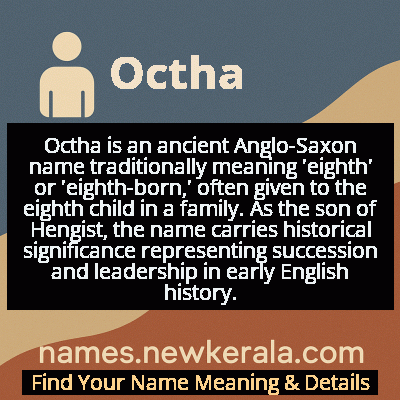Octha Name Meaning & Details
Origin, Popularity, Numerology Analysis & Name Meaning of Octha
Discover the origin, meaning, and cultural significance of the name OCTHA. Delve into its historical roots and explore the lasting impact it has had on communities and traditions.
Name
Octha
Gender
Male
Origin
Anglo
Lucky Number
2
Meaning of the Name - Octha
Octha is an ancient Anglo-Saxon name traditionally meaning 'eighth' or 'eighth-born,' often given to the eighth child in a family. As the son of Hengist, the name carries historical significance representing succession and leadership in early English history.
Octha - Complete Numerology Analysis
Your Numerology Number
Based on Pythagorean Numerology System
Ruling Planet
Moon
Positive Nature
Diplomatic, friendly, artistic, empathetic.
Negative Traits
Over-sensitive, moody, indecisive, prone to self-pity.
Lucky Colours
Green, cream, white.
Lucky Days
Monday.
Lucky Stones
Pearl, moonstone.
Harmony Numbers
1, 3, 4.
Best Suited Professions
Diplomats, mediators, caregivers, artists.
What People Like About You
Cooperative spirit, friendliness, artistic talent.
Famous People Named Octha
Octha of Kent
Anglo-Saxon Chieftain
Son of Hengist who succeeded his father as ruler of the Kingdom of Kent and expanded Anglo-Saxon settlements in Britain
Octha the Warrior
Military Leader
Led Anglo-Saxon forces alongside his father Hengist in battles against British kingdoms during the Saxon conquest
Octha of the Jutes
Tribal Leader
Helped establish the Jutish settlement in Kent and played key role in early Anglo-Saxon governance structures
Name Variations & International Equivalents
Click on blue names to explore their detailed meanings. Gray names with will be available soon.
Cultural & Historical Significance
The name Octha embodies the transitional period between Roman Britain and Anglo-Saxon England, symbolizing the fusion of Germanic traditions with British landscapes. As part of the Hengist and Horsa legend, Octha's story reflects the complex cultural exchanges and conflicts that shaped early medieval Britain. His lineage represents one of the oldest recorded Anglo-Saxon royal lines, making the name significant for understanding early English history and the formation of English identity during the Migration Period. The name carries the weight of this foundational era, connecting modern understanding with ancient origins.
Extended Personality Analysis
Individuals named Octha are typically perceived as carrying a legacy of leadership and tradition. They often exhibit strong, decisive characteristics with a natural inclination toward responsibility and authority, reflecting their historical namesake's role as a successor to a legendary leader. There's usually a sense of historical consciousness and connection to heritage that shapes their worldview, making them thoughtful and deliberate in their actions. They tend to value stability and continuity while understanding the importance of adaptation.
Octha-named individuals tend to be practical and grounded, with a strategic mindset that serves them well in leadership positions. They often demonstrate loyalty to family and tradition while maintaining the courage to forge new paths when necessary. The combination of respect for established ways with innovative thinking creates a balanced personality capable of both preserving valuable traditions and adapting to changing circumstances. Their strength often lies in their ability to bridge generations and maintain continuity while pursuing progress, making them effective in roles that require both reverence for the past and vision for the future.
Modern Usage & Popularity
In contemporary times, Octha remains an extremely rare name, primarily used by families with strong interests in Anglo-Saxon history or those seeking unique historical names with deep cultural roots. It appears occasionally in historical fiction and reenactment communities but has not entered mainstream naming trends. The name's usage is largely confined to academic circles, historical enthusiasts, and families with specific cultural or genealogical connections to early English history. Its rarity makes it distinctive and memorable, but its ancient origins and unfamiliar sound to modern ears limit its widespread adoption. There are no recent records of the name appearing in birth registries, indicating it remains primarily of historical and scholarly interest rather than practical contemporary use.
Symbolic & Spiritual Meanings
Symbolically, Octha represents continuity, legacy, and the bridge between generations. The name carries connotations of succession and the weight of inherited responsibility, reflecting the historical Octha's role as his father's successor. It symbolizes the transmission of leadership and cultural traditions across generations, embodying the idea that each generation builds upon the foundations laid by their ancestors. The numerical aspect of the name (relating to 'eighth') adds layers of symbolism including new beginnings, as eight often represents regeneration and the start of new cycles in various cultural traditions, while also suggesting completeness and the fulfillment of a cycle before beginning anew.

